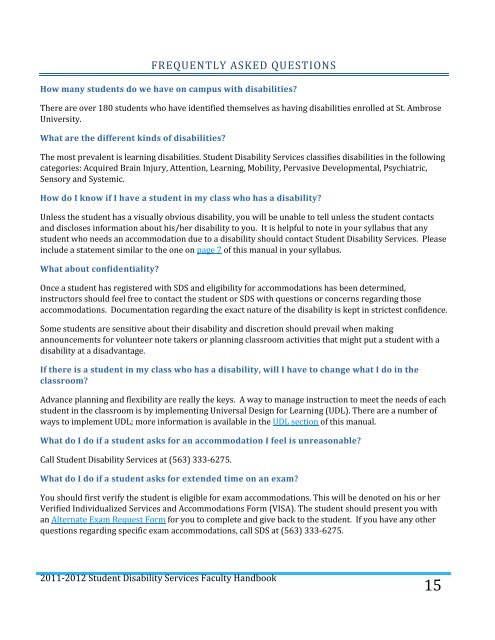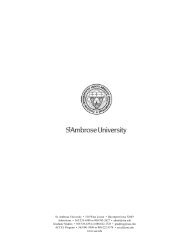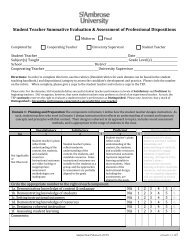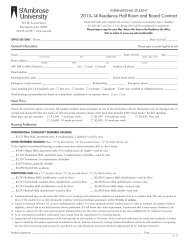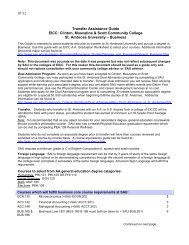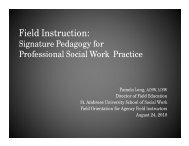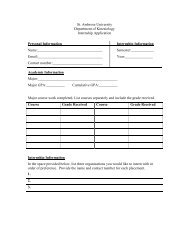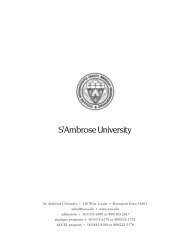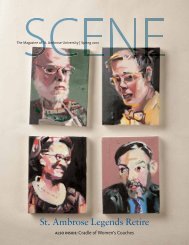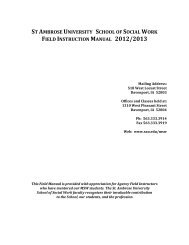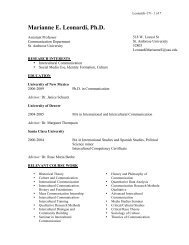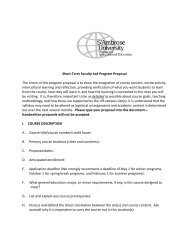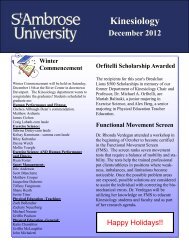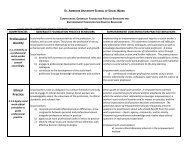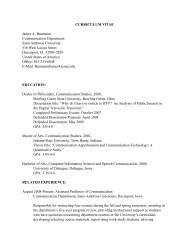student disability services faculty handbook - St. Ambrose University
student disability services faculty handbook - St. Ambrose University
student disability services faculty handbook - St. Ambrose University
You also want an ePaper? Increase the reach of your titles
YUMPU automatically turns print PDFs into web optimized ePapers that Google loves.
FREQUENTLY ASKED QUESTIONS<br />
How many <strong>student</strong>s do we have on campus with disabilities?<br />
There are over 180 <strong>student</strong>s who have identified themselves as having disabilities enrolled at <strong>St</strong>. <strong>Ambrose</strong><br />
<strong>University</strong>.<br />
What are the different kinds of disabilities?<br />
The most prevalent is learning disabilities. <strong>St</strong>udent Disability Services classifies disabilities in the following<br />
categories: Acquired Brain Injury, Attention, Learning, Mobility, Pervasive Developmental, Psychiatric,<br />
Sensory and Systemic.<br />
How do I know if I have a <strong>student</strong> in my class who has a <strong>disability</strong>?<br />
Unless the <strong>student</strong> has a visually obvious <strong>disability</strong>, you will be unable to tell unless the <strong>student</strong> contacts<br />
and discloses information about his/her <strong>disability</strong> to you. It is helpful to note in your syllabus that any<br />
<strong>student</strong> who needs an accommodation due to a <strong>disability</strong> should contact <strong>St</strong>udent Disability Services. Please<br />
include a statement similar to the one on page 7 of this manual in your syllabus.<br />
What about confidentiality?<br />
Once a <strong>student</strong> has registered with SDS and eligibility for accommodations has been determined,<br />
instructors should feel free to contact the <strong>student</strong> or SDS with questions or concerns regarding those<br />
accommodations. Documentation regarding the exact nature of the <strong>disability</strong> is kept in strictest confidence.<br />
Some <strong>student</strong>s are sensitive about their <strong>disability</strong> and discretion should prevail when making<br />
announcements for volunteer note takers or planning classroom activities that might put a <strong>student</strong> with a<br />
<strong>disability</strong> at a disadvantage.<br />
If there is a <strong>student</strong> in my class who has a <strong>disability</strong>, will I have to change what I do in the<br />
classroom?<br />
Advance planning and flexibility are really the keys. A way to manage instruction to meet the needs of each<br />
<strong>student</strong> in the classroom is by implementing Universal Design for Learning (UDL). There are a number of<br />
ways to implement UDL; more information is available in the UDL section of this manual.<br />
What do I do if a <strong>student</strong> asks for an accommodation I feel is unreasonable?<br />
Call <strong>St</strong>udent Disability Services at (563) 333-6275.<br />
What do I do if a <strong>student</strong> asks for extended time on an exam?<br />
You should first verify the <strong>student</strong> is eligible for exam accommodations. This will be denoted on his or her<br />
Verified Individualized Services and Accommodations Form (VISA). The <strong>student</strong> should present you with<br />
an Alternate Exam Request Form for you to complete and give back to the <strong>student</strong>. If you have any other<br />
questions regarding specific exam accommodations, call SDS at (563) 333-6275.<br />
2011-2012 <strong>St</strong>udent Disability Services Faculty Handbook<br />
15


